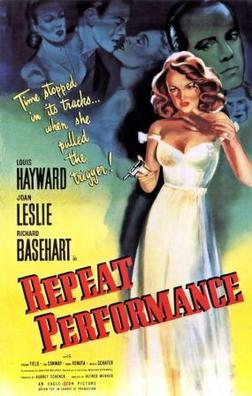Repeat Performance, At Last
 Finally got to see 1947’s “Repeat Performance” this week after several decades. Ten years ago (ten!) I wrote about my frustration in even figuring out the name of this old piece of noir. I last saw it when it featured on some cable channel somewhere in the mid-1980s, and while I often don’t remember a lot of plot points of films, some particular features of this one always stuck with me. In particular, I’d been interested in seeing it again because it was a New Year’s Eve movie, and there just aren’t a lot of films that take that as a topic (other than “The Apartment”). Figuring out its name didn’t turn out to be a total help at the time, because it wasn’t available anymore on VHS, wasn’t available yet on DVD, and streaming wasn’t a thing. Periodic searches through the years turned up nothing except the occasional bootleg that appeared to have actually been shot off a television screen. Still, it was eligible to be added to my Amazon Prime list even though it didn’t really exist — and then, suddenly, it did! So we had to watch it before it disappeared from our life again.
Finally got to see 1947’s “Repeat Performance” this week after several decades. Ten years ago (ten!) I wrote about my frustration in even figuring out the name of this old piece of noir. I last saw it when it featured on some cable channel somewhere in the mid-1980s, and while I often don’t remember a lot of plot points of films, some particular features of this one always stuck with me. In particular, I’d been interested in seeing it again because it was a New Year’s Eve movie, and there just aren’t a lot of films that take that as a topic (other than “The Apartment”). Figuring out its name didn’t turn out to be a total help at the time, because it wasn’t available anymore on VHS, wasn’t available yet on DVD, and streaming wasn’t a thing. Periodic searches through the years turned up nothing except the occasional bootleg that appeared to have actually been shot off a television screen. Still, it was eligible to be added to my Amazon Prime list even though it didn’t really exist — and then, suddenly, it did! So we had to watch it before it disappeared from our life again.
It stars Joan Leslie as a young stage actress who became a star in a vehicle written by the man who would become her husband, played by Louis Hayward. The movie begins with her shooting her wayward husband, who has been having an affair with the woman who wrote Leslie’s current starring vehicle. Fleeing the scene she finds her friend, a charming young poet played by Richard Basehart, in a role that otherwise would have belonged to David Wayne. As they try to get to someone they think will know what to do, she wishes she had the whole year to do over again. With no explanation, she gets her wish.
I was a little disappointed that one of my key memory points about the film, a fact that I had carried ever since I saw it in the mid-’80s, was, in fact, wrong. I recalled that the poet Basehart played was offered a bound volume of his poetry, with morocco endpapers. Always thought he was specific about the endpapers. Turns out, he was offered a volume on vellum, morocco-bound. The morocco was on the binding, not the endpapers. Most likely my brain confused morocco with marbled end papers. Why this change in detail disappoints me, it’s hard to say. Perhaps it was the idea that someone cared about how his endpapers looked.
It is a perfectly fine film for its time — not the best of its kind, but far from the worst. Plenty of scenery is chewed, but we expect that from this kind of affair. If you’re a fan of love triangle murder almost-mysteries, build-ups to inevitable fate, or what may be the thinnest mustache ever filmed (on Tom Conway), you’re probably into this. Also, to show the passing of time they used a theater marquis instead of falling pages from a calendar, an invention I appreciated.
Was this as good as most things you wait 30 years for? Yes, pretty much: exactly what I thought it would be, no better nor worse an experience than any other.
